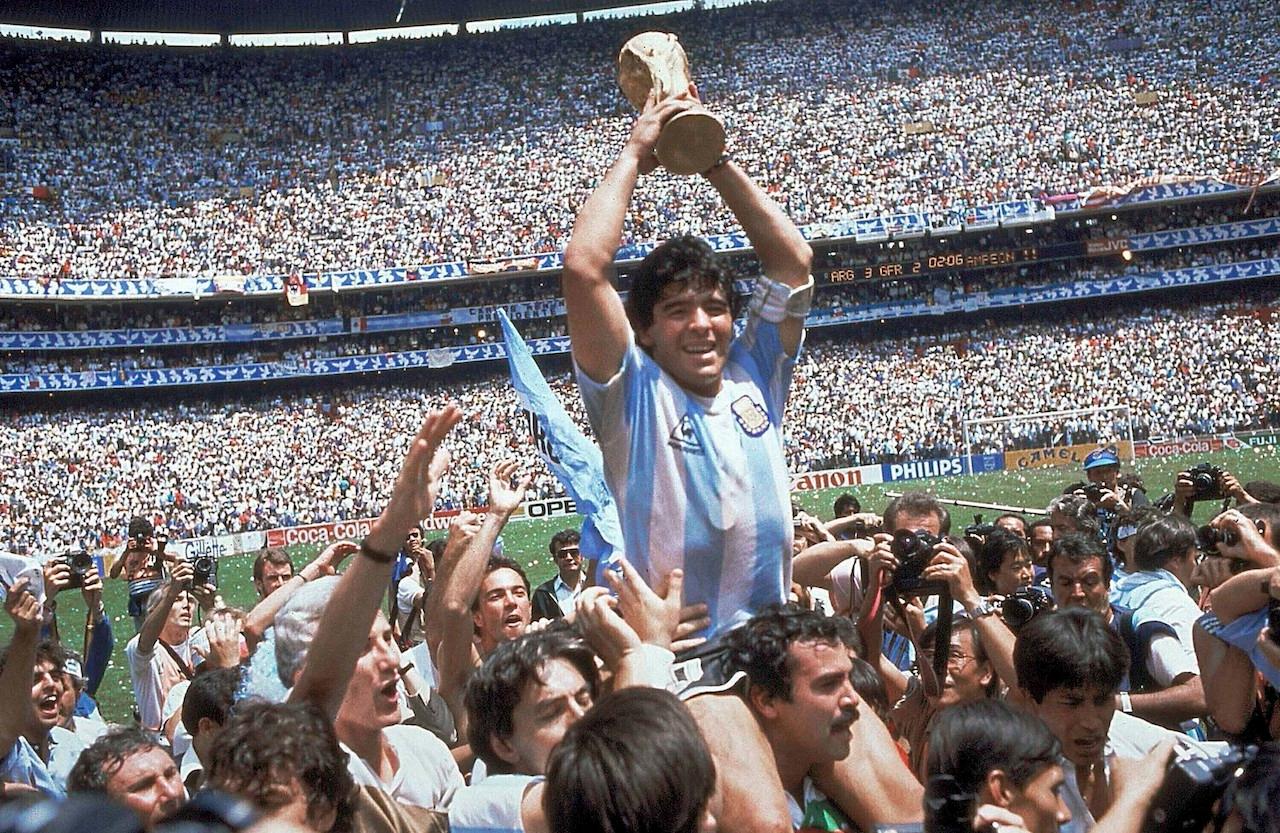Football legend Diego Maradona dead at 60
Maradona will forever be remembered for his 'Hand of God' goal against England in the 1986 World Cup quarter-final in Mexico City.
Diego Maradona, one of the greatest players of all time, died Wednesday at the age of 60, plunging his native Argentina and football fans around the world into mourning.
Renowned along with Pele as one of the finest players ever to grace the field, the Argentine World Cup-winning captain had undergone brain surgery this month and died of a heart attack, a member of his entourage told AFP.
Maradona will forever be remembered for his “Hand of God” goal against England in the 1986 World Cup quarter-final in Mexico City, when he pushed the ball into the net.
Minutes later he swerved through the helpless English defenders for a superb second goal, capping a victory that perfectly encapsulated the mixture of brilliant skill and often outrageous behaviour that ran through his life.
He struggled with addiction to cocaine and alcohol and had been plagued by poor health in recent years.
Pele described Maradona as a “dear friend” and the 80-year-old Brazilian said he hoped they would “play together in the sky” one day.
Gary Lineker, who was in the England team defeated in 1986, said Maradona was “arguably the greatest of all time” but referred to that infamous goal by tweeting: “After a blessed but troubled life, hopefully he’ll finally find some comfort in the hands of God. #RipDiego.”
Lionel Messi led the tributes from modern-day players to his fellow Argentine, saying: “He has left us but he will never leave us because Diego is eternal.”
Argentine President Alberto Fernandez announced three days of national mourning in the South American country.
Argentine media first reported Wednesday that Maradona had suffered a serious setback in his bid to recover from the surgery earlier this month to remove a clot lodged between his brain and skull.
Family members were summoned to his home north of Buenos Aires before the announcement of his death was made.
Grieving fans later gathered at the Obelisk landmark in the center of Buenos Aires and at Boca Juniors’ stadium, the Bombonera, where Maradona played from 1981-82 and 1995-97.
‘Hand of God’
The life of the divine footballing talent that was Diego Armando Maradona was marked by wild highs and lows, with Argentina and club sides Boca Juniors, Barcelona and Napoli.
Excesses with drugs and alcohol had long taken their toll on the mercurial talent’s health.
Maradona was admitted to hospital three times in the last 20 years for serious health issues – two of which were potentially fatal – due to his addictions.
The highs were crowned by his performances when he captained Argentina to World Cup glory in 1986.
In the final, Maradona set up the 86th-minute winner against West Germany. He scored twice in the semi-final against Belgium, beating four defenders for the second goal.
But the match that defined his tournament, and possibly his career, was that win over England, in which he scored two goals that will be remembered forever – for very different reasons.
In the 51st minute, as England goalkeeper Peter Shilton reached to catch the ball, Maradona jumped alongside him and with a deftness that fooled the eye, flicked the ball with his hand through the England goalkeeper’s arms and into the net. The referee allowed the goal to stand.
After the game, Maradona said he scored “a little with the head of Maradona and a little with the hand of God”.
The goal he scored four minutes later, when he picked up the ball in his own half and glided past six England players, was named “Goal of the Century” by FIFA.
Adored in Naples
Maradona grew up in poverty in Buenos Aires but his extraordinary talent was clear from a young age at Argentinos Juniors and Boca.
He moved to Barcelona but was singled out for rough treatment by opposing defenders and soon fell out of love with the Spanish club.
It was in Naples where Maradona would enchant an entire city by leading the then unfashionable Napoli to their only two Italian league titles in 1987 and 1990, befriending a mafia family along the way.
“Always in our hearts. Ciao Diego,” Napoli tweeted. “There are no words to describe the pain we’re going through.”
Napoli president Aurelio De Laurentiis and Naples mayor Luigi de Magistris on Wednesday both called for the club’s Stadio San Paolo to be renamed in tribute to Maradona.
He was honoured with a minute’s silence before Wednesday’s Champions League games in Europe.
In recent years, Maradona, reduced to hobbling by the ravages of his career and lifestyle, had coached in the UAE, Mexico and Argentina without ever hitting the heights of his playing days.
In 2000, FIFA ran an online Player of the Century poll. Maradona gained 54% of the vote, Pele was second with 18%. FIFA declared them joint winners.
Maradona married his long-time girlfriend Claudia Villafane in 1984. They had two daughters, Dalma and Gianinna, but the relationship was punctuated by Maradona’s extra-marital affairs and they divorced in 2004.
He also had a son, Diego Junior, born in Naples in 1986, although he only acknowledged paternity in 2004.
Subscribe to our newsletter
To be updated with all the latest news and analyses daily.
